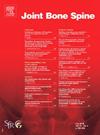Advanced combination therapy in inflammatory bowel disease
IF 3.8
3区 医学
Q1 RHEUMATOLOGY
引用次数: 0
Abstract
Background
The advent of advanced therapies in the recent years have improved outcomes for inflammatory bowel disease patients, but a significant subset of patients remains refractory to monotherapy. Advanced combination therapy, involving two biologic agents or a biologic combined with a small molecule drug, is emerging as a potential strategy to improve clinical remission and address extra-intestinal manifestations.
Methods
This narrative review summarizes current evidence on advanced combination therapy for inflammatory bowel disease, including mechanisms of action, clinical efficacy, safety considerations, and future perspectives. Key clinical trials and real-world studies were analyzed to assess advanced combination therapy outcomes.
Results
Preliminary data indicate that advanced combination therapy enhances response rates in patients who fail monotherapy and appears to be a new therapeutic option in patients with refractory disease or extra-intestinal manifestations. However, long-term safety concerns remain, and few clinicals trials have investigated advanced combination therapy, and standardized guidelines regarding its use in clinical practice are lacking.
Conclusions
Advanced combination therapy represents a promising yet evolving approach in inflammatory bowel disease management. Future research should focus on optimizing combination strategies, identifying patient subgroups most likely to benefit, and establishing safety profiles through large-scale controlled trials. The integration of precision medicine approaches, including biomarker-driven treatment selection, will be crucial in maximizing the efficacy of advanced combination therapy in clinical practice.
炎性肠病的高级联合治疗。
背景:近年来先进疗法的出现改善了炎症性肠病患者的预后,但仍有相当一部分患者对单一疗法难以治愈。先进的联合治疗,包括两种生物制剂或一种生物制剂联合一种小分子药物,正在成为改善临床缓解和解决肠道外症状的潜在策略。方法:本文综述了目前关于炎性肠病高级联合治疗的证据,包括作用机制、临床疗效、安全性考虑和未来展望。我们分析了关键的临床试验和现实世界的研究,以评估晚期联合治疗的结果。结果:初步数据表明,在单药治疗失败的患者中,先进的联合治疗提高了应答率,似乎是难治性疾病或肠外症状患者的一种新的治疗选择。然而,长期的安全性问题仍然存在,很少有临床试验研究高级联合治疗,并且缺乏关于其在临床实践中使用的标准化指南。结论:在炎症性肠病的治疗中,先进的联合治疗是一种很有前途但仍在发展的方法。未来的研究应侧重于优化联合策略,确定最有可能受益的患者亚组,并通过大规模对照试验建立安全性概况。精确医学方法的整合,包括生物标志物驱动的治疗选择,对于在临床实践中最大化高级联合治疗的疗效至关重要。
本文章由计算机程序翻译,如有差异,请以英文原文为准。
求助全文
约1分钟内获得全文
求助全文
来源期刊

Joint Bone Spine
医学-风湿病学
CiteScore
4.50
自引率
11.90%
发文量
184
审稿时长
25 days
期刊介绍:
Bimonthly e-only international journal, Joint Bone Spine publishes in English original research articles and all the latest advances that deal with disorders affecting the joints, bones, and spine and, more generally, the entire field of rheumatology.
All submitted manuscripts to the journal are subjected to rigorous peer review by international experts: under no circumstances does the journal guarantee publication before the editorial board makes its final decision. (Surgical techniques and work focusing specifically on orthopedic surgery are not within the scope of the journal.)Joint Bone Spine is indexed in the main international databases and is accessible worldwide through the ScienceDirect and ClinicalKey platforms.
 求助内容:
求助内容: 应助结果提醒方式:
应助结果提醒方式:


